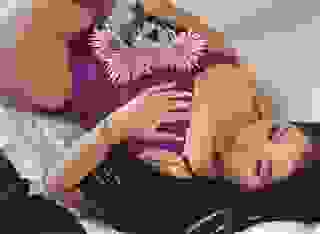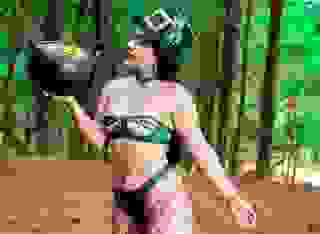- Sci-Fi & Fantasy
- Sweet Dreams Ch. 05: Due South
Note: You can change font size, font face, and turn on dark mode by clicking the "A" icon tab in the Story Info Box.
You can temporarily switch back to a Classic Literotica® experience during our ongoing public Beta testing. Please consider leaving feedback on issues you experience or suggest improvements.
Click hereThe south is slippery as an eel. Three years after I became king, pirates from Dagrala, Dagrahir and Kalron worked together to attack over 30 of our merchant ships. They sent back one ship with heads of most of our men in barrels. Those who survived were too afraid to ever come near the sea again. I knew that it would not lead to anything, but I had to declare war to them. Once more.
My army crossed the Haldur and my fleet finally conquered the peninsula of Agdulmek. But I was not able to engage even one of the cities in a battle. Their armies always retreated, lured us into ambushes and my soldiers' numbers dwindled. I think we killed about 500 of them, while we lost nearly 25.000 men in battle, not only against the enemy, but also against sickness and the dangers of nature.
At least we finally could add the peninsula to our kingdom. I made Agdulmek the fleet headquarters, so that we could escort our trading ships through the channel. But at what cost? The fleet is expensive, and tensions were high, so the free cities were not willing to accept the kingdom as a trading partner if all our ships were escorted with military.
Four times we tried to at least conquer Nuret, the city at entrance to the channel. We never could. When we came, they retreated and let us wash over the city like the waves of the sea. Then they burned down our ships and hunted our men to death.
Although tensions between the cities were high, we never could really set a foot on the ground there. People immigrated from the free cities to the kingdom over the years. We were very suspicious of them. But after some time, we found out, that they fled, because of the tyrannic treatment they had to endure. They were slaves, daughters forced to marry as part of a trading deal, men who had lost all their money in dangerous gambles. They could flee, because after the wars they knew, that the kingdom would never hand them over to the free cities. They began to work for the government and today we know more about the free cities than ever before.
Still, the south is slippery as an eel.
I closed the book and stashed it back into my saddlebag. When I looked out the window, I saw the first signs of the sun coming up in the east. I blew out the candle and soon after I heard voices from the grooms in the stables. I put on my clothes, took my bags and blew out the candle.
When I came downstairs I saw the owner of the house and I immediately recognized him. He was at my father's funeral, standing not far from me. He looked at me shocked and was about to fall to his knees, when I looked him in the eyes and shook my head.
I walked towards him, held out my hand to greet him, "My name is Haruk, duke of Lambaragh. I am the king's emissary." He seemed to understand.
"Of course. I am Lazath, count of Vetanu."
"Thank you for your hospitality, Lazath."
"I could have done more, had I known whose emissary you were."
"The king sent us on our way on very short notice. We were able to accommodate in your guest rooms perfectly."
"I will send my scouts to my friends and have them prepare quarters for you riding party. Where do you plan to travel?"
"I will talk to my men, but I think we already made enough trouble."
"Will you at least take an early breakfast with me."
"That would be very kind of you. I will awake some others of our party to join us."
I started to go upstairs again to wake Mandrak and Tangara, but they were already coming towards me down the stairs.
"Good morning, Tangara, Mandrak. Count Lazath has invited us for an early breakfast."
The prospect of a breakfast seemed to lighten their morning mood.
"I think we should invite our military commander, Ladar, too."
Ten minutes later we sat around a table and servants brought in a delicious breakfast.
"Where do you intend to go? Maybe I could help prepare more quarters for you along the way," Lazath asked.
I looked at Tangara and Ladar and they both nodded, "We travel down south, to see what happened to the free cities in the earthquake. They seem to have been hit very hard."
"Does the king intend to help them?"
"Maybe. In exchange for peace and trade."
"Peace we have, at least we are not at war with them. Trade on the other hand; trade with the free cities would be good. Their merchants have the most exotic and intriguing goods. Our merchants can only buy those through front men."
"Do you trade yourself? It is quite unusual for a nobleman."
"Vetanu, some territory around the city, that is my only property. My uncle gambled it away. I inherited what was left of it. When my father recognized that he would never get anything out of his brother, he began trading goods, especially with the south. He was well connected to the capital and to all the cities down to Agdulmek and further.
I use my inheritance to fund my trading, and the trade my father taught me, to buy back some of my inheritance."
"Do you think the king would be interested in your perspective on the south, the channel and trading with the free cities."
"Maybe, but since there is officially no trade with the free cities, I cannot officially talk to him about that. Unofficially on the other hand, I could talk to him and some people in the trade ministry for hours."
"Would you talk to him, if you were in a position, where you did not need to talk officially?"
"I would say, I have proven this at length."
"Lazath, you will send scouts and prepare our travel to Jugoah and to the low pass. You will try to find food and shelter for us in the valley of Falir and Zaffa. You will ask your friends in Ladorn, Buladri, Gutmir and other cities on our route to the south, to join our efforts to make peace and trade with the south.
I will write a letter for you. As soon as you made your preparations, you will take this sealed letter to Rallagoah. You will go to the Ceremonial Palace. On the ground floor under the Hall of Selection you will find Office Number 4. You will bring this letter there and ask to see Naral, the duchess of Lambaragh.
You will hand her the letter and listen to everything she says. The king will not see you. He is very busy at the moment.
Should the seal be broken, the duchess will not see you and you will be thrown out of the palace."
He looked at me in awe. Mandrak had prepared a piece of paper and my seal, while I spoke to Lazath.
"Lazath, you are a good man. You should spend more time at the king's court, especially in the trade ministry."
I wrote to Larna, that I missed her already and that I was looking forward to seeing her. I asked her to receive Lazath and give him a permanent position in the trade council, that would allow him to permanently use a room in the palace but also to stay in contact with his friends in the south. We usually used a dialect from far west to write our letters. It was her mother's language and nobody from around the capital seemed to understand it very well.
"Are you married Lazath, do you have children?"
"Yes, my wife is still asleep upstairs, as are my children. Two daughters and two sons. The oldest is fourteen and the youngest is three years old. I will just walk upstairs to wake them."
"No, no! Lazath, let them sleep. We will start soon. There will be enough opportunity to meet. Maybe you should consider sending one of your children to the Children's Palace as a ward. I think the king would appreciate it very much."
I sealed the letter and gave it to him.
"Would you please talk to Ladar about the best route to the south. Mandrak, Tangara and I will prepare our horses."
As soon as we were outside, Mandrak turned to me: "I think Ladar does not need help to find the right route to the south!"
I looked at Tangara, she just smiled. "Tangara, would you be so kind, to answer my good friend's question."
"The duke gave a man, who has not only unofficial, but at the moment illegal ties to the south, an opportunity. An opportunity to make them official and to put them to good use for the kingdom. A nobleman, even if he only owns a small property, would never bother to trade with the free cities, if it is not something big in it for him. He may use front men to cover his tracks, but he has direct ties to the free cities. He will be more open, if he feels needed."
We went to the stables and prepared our horses. Ladar's men had already prepared his. When we got back to Lazath's house both men were already outside and talking. I went to Lazath to thank him for his hospitality and his help with our journey.
As soon as we were on our way, Tangara came to my side to talk. "The merchants and traders might be of good use to transport food and goods the free cities need."
"This was my thought, as soon as he talked about himself trading. But I could never have contacted the merchants via the ministry. They would be too afraid to talk about their illegal operations. I never understood why my... why king Rakkar ceased all official connections with the free cities.
I understand that what they did to our people in the war was not a battle, it was a slow slaughter. In the end they would not trade with us, and we would not trade with them -- officially. So, the kingdom loses trade taxes, and the merchants need front men, mostly from the southwest. And I think they are being paid very well for doing nothing."
"What do you intend to do? Will you make trade with the south legal?"
"Of course. In case they will become part of the kingdom trade will be legal anyway. But I intend to legalize it before we reach the Haldur. Tonight, I will write a letter to the Ministry for Trade and have them prepare a new law. I will sign it in Jugoah."
"So, in Jugoah you will not be duke Haruk?"
"We will see. Maybe for just as much time as I need to sign the document. To be proclaimed in all of Rall'enagil the law will have to go back to the Office of Promulgation anyway."
"I think I do not have to teach you about the south as much as I thought."
"Oh, no. You must teach me many things. All I know is about us and the south. But I know nothing about the inner relations of the free cities. Who leads and who follows? What are their political systems? Do they each specialize in anything?"
For the next five days Tangara seemed to tell me everything she knew. We stayed in the cities Ladorn, Buladri, Hederas, Gutmir and Jilmanu. In each city merchants were hosting us. We had good rooms, enough to eat and stables for our horses. The merchants were very eager to help us -- and to help us help them. Lazath really did, what I asked of him. His trading network worked very well.
Along the way three letters from Larna reached me. She was doing well and thankful for being informed about what happened to us along the way. I tried to write to her every day. But on some evenings, I was so tired after riding for a whole day, talking to dozens of people in the cities and listening to Tangara's lessons about her ancestors' home. Also, I neither had the energy nor the time to read more of my father's stories, although there were some about the south.
The ten free cities, Nuret at the entrance to the channel, Kalron, Almurs, Rivani, Dagrala and its twin on the other side of the channel, Dagrahir, Nefatil, Sintela, Sorajim and Tharos had some sort of ranking order.
First was Dagrala. It was the biggest and most potent city, they had lands, controlled the southern side of the low pass over the Haldur, they had the most ships and could in some matters speak for all the free cities.
Next was Tharos, the southernmost city. It was Dagralas big rival. Once it seemed to be bigger and richer than Dagrala, but they lost their edge, when the kingdom rose and more ships from north drove through the channel. For Dagrala it was easier to rob them or to demand ransom and they were the nearest city to the Low Pass, they could reach the kingdom on sea and on land.
Then came Nuret, due to its position at the channel's entrance from north, Nefatil, Sorajim, Sintela, Almurs, Dagrahir, which was more a colony of Dagrala, than an independent city, Kalron and Rivani.
All the cities were led by aristocracy. It worked differently in each of them. In Dagrala the lead families would elect a Doge in a very complicated system from amongst them. He would then be the city's leader for life. Life for those, who were not part of the leading families, was brutal. In their religion those, who were liked by the gods, would experience economic prosperity. Those who did not prosper were not in the gods' favour and could be cast away, enslaved or whatever the leading families decided to do with them.
This was even the case with their own family members.
Women were not seen as people who could choose their way of life independently. Usually, they were not allowed to decide anything in their lives. Sometimes a father would use a daughter like a trading good and make her part of an especially worthwhile trade.
Tangara told about the history of each city, of their inner diplomatic relations. They would form coalitions when necessary. When left in peace, they tended to fight against each other. Every time an outside enemy was against one of them, they stood together.
When other cities tried to become one of them, they immediately destroyed it and most of them did not exist anymore. One of those cities was Agdulmek, which was in fact saved, when the kingdom conquered it. Otherwise, it would have been destroyed by the free cities sooner or later.
On the morning of the sixth day, we started from Jilmanu to the last city before the border, Jugoah. After Jugoah our way would climb up the Haldur, a chain of mountains that separated the southwestern part of Klauvelas from the rest of the continent. There were some passes. We intended to use the Low Pass in the east. We would go up the valley of the river Jildak and on the southern side down the river Falir.
On the pass was the border between the kingdom and the free cities. The first settlement on the southern side was Faltara, a town in the territory of Dagrala. Ladar estimated that we would camp two or three times, before we would reach Faltara, and we did not know what would await us there.
After everything we had heard, I had the Ministry of Trade and our fleet move relief supplies to the south, no matter what the outcome of my journey would be. Our scouts had already crossed the border, met with scouts from Dagrala and come back.
They would await us and were eager to speak with the king's emissary about the future of the free cities. But our scouts could not tell anything conclusive. We were not sure if it was because of the earthquake or because the southerners did not want to tell anything.
Before we started our last easy part of the journey Ladar turned around his horse and held a short speech.
"Jugoah is a garrison town. We will stay with the military. There will not be any reason to celebrate. Tomorrow in the morning we will start the ascent to the Low Pass. This name should not hide the fact, that the journey is dangerous, especially at this time of the year. We will have to camp at least two, maybe three times, before we reach Faltara. We do not yet now, what the situation is down there. In Jugoah there is already some damage from the quake, but not too much.
Our scouts tell us, that the rivers Falir and Zaffa carry much water, it has been raining for days. In Jugoah duke Haruk will announce some changes in the relations between the kingdom and the free cities. Those changes will make our journey easier, but it will still not be a stroll.
Once we have reached Faltara, we will travel to Dagrala. This usually takes two days. The scouts from Dagrala mentioned no problems on this part of our route until now."
We started our journey to Jugoah. On the southern horizon we could see the mountains of the eastern part of the Haldur. These mountains separated us from the south, but also from the peninsula of Agdulmek. Jugoah was founded by my great-grandfather, king Shathor VI., as a garrison city to protect the northern side of the low pass. Its garrison is placed in a narrow passage in the Jildak valley.
The garrison was manned with about 4000 soldiers, since the southern border was relatively quiet. It could house up to 15.000 men, when necessary.
When the sun came up high enough and Tangara felt, that she had talked enough about the free cities, I took my father's book and began to read about his journeys. My horse, Talalla, followed Mandrak's horse on its own, so I could read. There was no wind, and it was relatively warm in the sun.
When I left the territory of the empire for the first time, it was a strange feeling. It was like leaving home, even though there are many places in the empire I have never set foot in. My father had left the empire a few times, always to fight a war. I left the empire to be guest of the Rijak of Kladur in the western part of Rivelas. Before I travelled there, the Rijak was my guest in Rallagoah for a whole month.
Like him I came with a big entourage to talk about trade agreements, minor border problems, fishing rights, and so on. These negotiations did not need me as a king present, but I was there to flatten some paths and to build trust.
We even exchanged wards, so we could better learn about each other's culture. Four of my wives came with me. The realm of Kladur also knew royal polygamy, but it was slightly different. I never understood the differences, I had enough trouble in understanding my own Inner Palace.
In long evening sessions with the Rijak and his family, his friends and some noblemen and women from Kladur and the neighbouring realms I learned much about their society, their families, and their religion.
Once his first wife asked me, why there were no women amongst the leading ministers in my entourage. I was not able to give her a conclusive answer. I knew she would not be satisfied with "Because that is the way it alwas has been." In Kladur the Rijak was not necessarily a man. Other than the king of Rall'enagil.
She really made me think. At the time I had already two sons and the firstborn would become king and emperor. But what if my firstborn would have been a girl.
I always thought that our kingdom was a paradise for women. And it maybe was compared to our neighbours, especially the free cities, where women are seen as nothing more than trading goods or cattle. But then I saw that we still had a long way to go. My grandfather made it possible for women to become government officials, he even thought about women in the military. He opened the universities for women and cared for his daughters as much as for his sons.
But still, they are not the same.
I spent a month in Kladur and when I came back, I felt the need to change everything right away. My queen, Darnela, stopped me, "You were in Kladur for a month, and you saw how some things could be. Your people were not. Give them time and change things step by step."
So, I changed things step by step, I made women my chief ministers and some women even joined the military. Women became part of the council of high priests, mayors, could represent their families, inherit, and so on. I think, right now, a woman is not stopped to do anything by being a woman. Except in the royal family. I never figured out how to change the palace to make it possible for a woman to rule the kingdom and the empire.
But maybe this decision is not up to me. My first four children are sons, so there is no immediate need to answer this question. But the next king will have to think about it, and he will have to change things. Maybe the kingdom could accept a queen with many husbands and concubines, or even husbands and wives. I don't know. What I know is, that royal polygamy is a perfect way to tighten diplomatic bonds -- I would advise against abolishing it.








